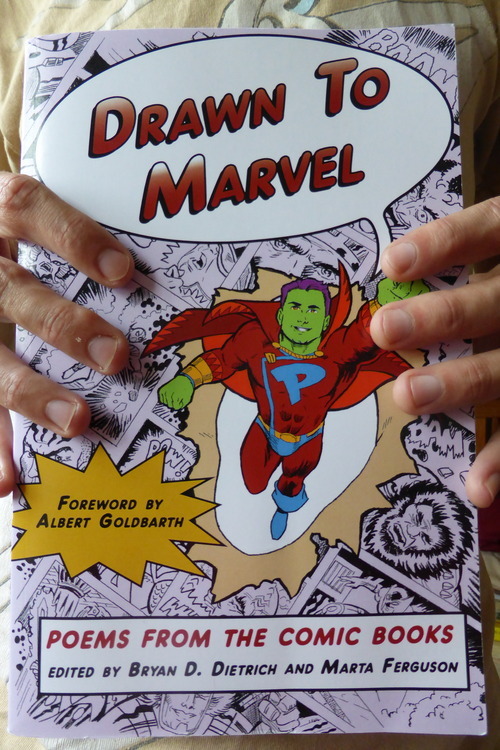
American poetry is a whole ‘nuvver thing and I barely know where to start with it. There are high profile exports like Timothy Donnelly and Michael Robbins, and then, beyond them, billions and billions more poets, some very interesting indeed. I paid through the nose for Cunt Norton by Dodie Bellamy, and it was worth it. I’m also going to be reviewing two pamphlets of computer game poems by separate US poets, published by separate US presses. But honestly, I’ve barely touched the dust on the surface.
Anyway, I have two pieces (‘Dearest Wolverine’ and ‘Chamber’) published in this absolutely massive anthology from Minor Arcana Press, edited by Bryan D. Dietrich and Marta Ferguson. They’re both poems that first appeared in my Silkworms e-pamphlet, Thra-koom!. Fellow Brit Harry Man also makes an appearance, with a cut-up entitled ‘J. Jonah Jameson’, and literary stars like Albert Goldbarth and John Ashbery are likewise present and correct.
Oh, it is a very generous collection indeed, with a Foreword, Editors’ Note and and Introduction, followed by nearly 300 pages of poems. With that, though, comes the observation that it might have benefited from tighter editing. Once you’ve read Michael Marton’s brazen and memorable ‘The Sex Life of the Fantastic Four’, there’s really no need for any other Fantastic Four poems. Similarly, all the very well known superheroes you can think of – Batman, Superman, Spiderman and, yes, Wolverine – are over-represented. You have to dig around for work that probes more deeply into the Marvel/DC universes.
Most of the pieces play, as you’d expect, with the tension between our ‘real’ world and the idealised world of comics, or juxtapose poetic tropes with those of superhero fiction. A few – the more successful ones, in my opinion – have clear ambitions to tamper with the mythology. I do wonder sometimes – chiefly for the benefit of my own work – about the purpose of poetry engaging with pop culture in this way. I think at least part of it is putting in a claim for public ownership of certain intellectual properties, taking them and making them malleable in an age of copyright lock-down. If corporate juggernauts want to sell us their stories and make us care about their creations, then they must submit to the human impulse to tear off, reshape and share.